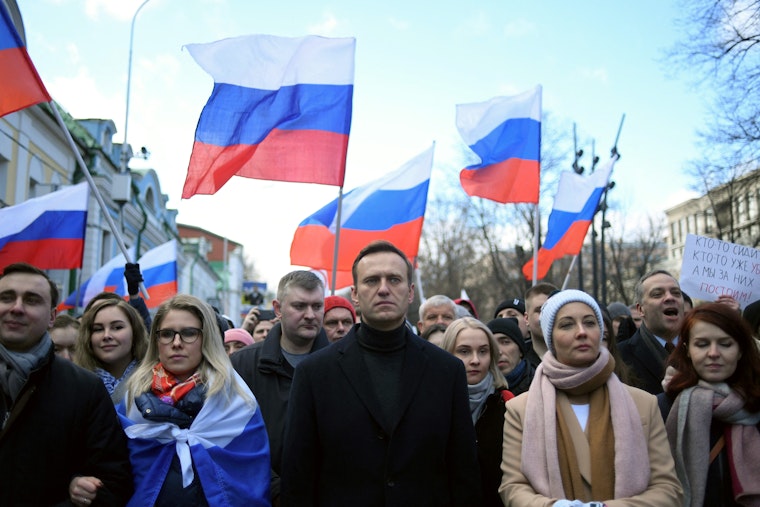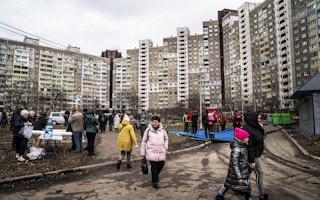Night Country: The Mysterious Death of Alexei Navalny in Putin’s Russia
By Vladyslav Galushko

In 2006, Russian journalist Anna Politkovskaya, a critic of the rising power of Vladimir Putin, was shot to death at her home in Moscow. Nine years later, in February 2015, leading opposition figure Boris Nemtsov was shot dead as he walked across a bridge near the Kremlin. Now, Alexei Navalny is dead in a prison camp in the Russian Arctic.
Navalny was a rising political star in the dwindling cohort of Russian opposition activists: he had already survived a poisoning attempt with the nerve agent Novichok in 2020, and yet bravely returned to Russia despite the certainty of arrest and prison. Even from prison, he used his YouTube channel to continue speaking out against the regime.
With Navalny’s death, the Russian Federation moves another step closer to totalitarianism where any threat to the ruling regime (however ephemeral) has to be immediately extinguished. Navalny died at the hands of a judicial system that has been instrumentalized for political repression. His fate underlines an overwhelming sense of lawlessness that affects everyone who comes in contact with the Russian state. Any form of dissent or even ordinary disagreement is being handled through violence—violence that will make it so much harder to bring the country back into any semblance of the rule of law in a post-Putin era.
The death of Navalny also highlights the clear limits of Western pressure on Russian elites. Having dispensed with any formalities of stately conduct since the start of the full-scale invasion against Ukraine, the regime appears determined to disregard any guardrails on its behavior. Moscow knew that Navalny’s death would be regarded as a political murder outside Russia. Yet it was allowed to happen.
The death of Alexei Navalny also underscores the paradox of Russian power—that the voice of one man imprisoned and isolated in the Arctic should be such a threat. The regime that is trying to project strength and power abroad feels so vulnerable and brittle at home that it resorts to imprisoning and physically eliminating its political opponents.
It is important to remember that our understanding of Russia is likely incomplete and inadvertently influenced by Russian propaganda due to the lack of access to credible economic data, scarce reporting on the ground, and a poor grasp on realities beyond Moscow and several major cities. Like the Soviet Union and Russian empire in the past, a political implosion in Russia is likely to come unexpectedly.
What does this mean for the West, and for Open Society? These are some of my initial thoughts on hearing the news.
- Despite the grimness of the current situation, continued international support to human rights defenders inside the country is vital to ensure that ordinary people have access to legal defense and the system does not fully revert to a Stalinist form of show trials and forced confessions. Supporting independent Russian media (now mostly in exile) is no less important, lest we end up relying on geopolitical tea-leaf reading in Western capitals or Russian official pronouncements that use information as a tool of hybrid warfare.
- We should re-assess the currently prevailing perception of Putin’s rule as strong and durable, which emerged after the failure of the mutiny by the Wagner Group and its leader Yevgeny Prigozhin (also now dead).
- While the West cannot change the calculus of the Kremlin, it should continue to signal through sanctions and other measures that such actions would have consequences for anyone involved. This sends a message to ordinary Russians that the West is watching; it may serve as a deterrent to some lower-level officials.
- In the meantime, the West should ensure that Russian activists and opponents of the regime can either leave Russia or have a readily available escape route, including U.S. and Schengen visas, to travel on short notice.
For me, the Kremlin’s fear of Navalny indicates that the narrative of inevitability the Russian regime projects about its success and hold on power is deeply misleading. We should keep that in mind as Russia’s war in Ukraine enters the third year.
There is nothing inevitable about a Russian victory in Ukraine. There are many questions about Moscow’s ability to ramp up military production, withstand sanctions in the medium term, and secure economic growth with an overheating economy saddled with labor shortages. Few events would have more profound impact on shaking the foundations of Russian authoritarianism than a loss in Ukraine that would likely force a profound reckoning with the malignant nature of Russian power at home and abroad. The West has little influence over what happens inside Russia. It has a lot of influence over what happens on the battlefield in Ukraine. It should leverage that.
Vlad Galushko is an associate director overseeing the work of Open Society in Eastern Europe.


